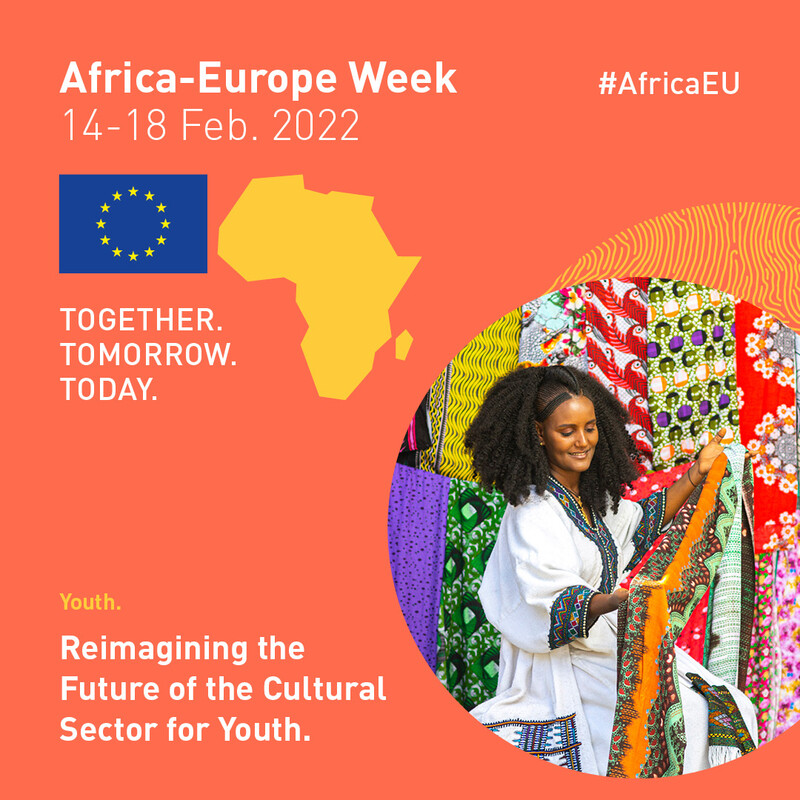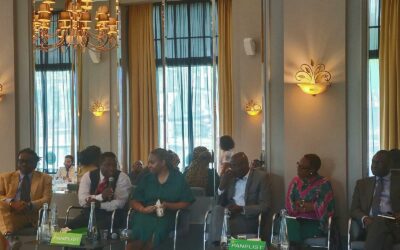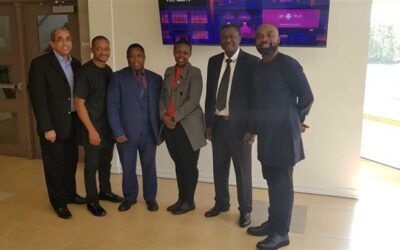The Africa-Europe week was organised from 14 until 18 February through both online as physical gatherings, in Brussels. Including in the week was the long-awaited 6th African Union – European Union Summit, from the beginning at the centre of the attention considering that the last edition was organised in 2017. Postponed several times due to various reasons, such as the COVID-19 pandemic, this meeting was to herald the reform of the relationship between Europe and African countries. ADEPT’s participation in this week summarised below.
What was at stake?
The revived and increased interest in the African continent by various other partners changed the reality of the relationship between African countries and Europe. Pushed by this reality, both parties decided to meet and ‘reset’ their relationship. Important questions such as health, investment and financing for growth, peace and security, and climate change were expected to be on the table. However, most of the attention would go to COVID-19 and migration nonetheless. For African countries, it was essential to discuss on changing the asymmetric cooperation with the aid logic to one of investment on the continent. On the other hand, the European Union would go to great lengths to convince the African side of its reliability, as other parties court the continent. Finally, civil society organisations, including diaspora fractions, also made it clear that they wanted to be heard during the summit. After feeling passed over in 2017 in Abidjan.
During the height of the ravaging COVID-19 pandemic, the African diaspora showed its force as a collective block motivated by its moral duty to ‘leave no one behind’ and offer solutions based on the reality of their home country. Thus for ADEPT, it was imperative to be heard during this week. Furthermore, to have the two parties to consider the African diaspora an intermediary ready to be included on all levels of the partnership.
The course of the Africa-EU week
The days before the summit, politicians, civil society organizations, representatives of private companies and NGOs engaged on an online platform, about current issues. The youth organisation African Diaspora Youth Forum (ADYFE) set the pace, invited by the African Union Diaspora Youth to discuss education, skills and youth innovation. On 15 February, ADEPT represented by its members FEASO and Africa Centre Ireland participated in two sessions. M. Yera Dembele, president of FEASO and ADEPT’s treasurer, shared his expertise on the economic weight of migrants in Session 5: Migration as a force for development between Africa and Europe. M. Mbemba Jabbi, Executive director of Africa Centre Ireland and board member, discussed his experiences regarding social integration of migrants and livelihood projects in The Gambia in Session 9: Ensuring dignity and human rights of people on the move. Radio Afrika TV and ADEPT’s president, M. Alexis Neuberg, had the opportunity to close the day. In his passionate speech, he insisted on the importance of the diaspora as bridge in this Africa-EU partnership. A successful presence of the African diaspora in this forum.
Essential outcomes of the Summit
On February 17 and 18, African and European world leaders met to listen to the findings of the findings to various actors discussed the days before and to finalize a joint agreement. As visible as the African diaspora was during talks by civil society and local authorities, it was invisible during the summit. The brief joint statement mentions key agreements such as the private-public investment package called “Global Gateway”, the €100m support to African Medicines Agency over 5 years and the provision of 450 million vaccines to Africa by mid-2022. However, regarding the migration issue, it remained a vague agreement to strengthen legal pathways. Concrete solutions are not mentioned. A disappointing observation is that as essential stakeholder, the African diaspora is not mentioned once in the statement. The essential role that diaspora plays as a collective bloc is still too often overlooked by both African and European Union.
What after the summit ?
Considering the recent political-economic and health situation all over the African continent, ADEPT will continue to urge the African and European Union to include the African diaspora on all levels of the partnership. However, with countries as Senegal and France at the head of these entities concrete opportunities can be elaborated. Therefore, it recommends to emphasize on following working points:
– Migration and development
ADEPT reiterates that it is not stricter migration laws, pushed by the European realism, that will reduce the expansion of migratory flows but rather concrete and correct investments on the African continent and especially by using the networks of the diaspora working and living within the borders of the European Union. Circular migration and two-way mobility schemes should be promoted, secured and where relevant intensified through the development of twinning agreements between academic or health institutions for instance. In this respect, Diasporas should largely be mobilised for them to impart the skills, knowledge and experience gained in residence countries. To conclude, the outbreak of the Coronavirus highlighted the crucial role played by migrant workers and those with a migrant background during the pandemic.
– Funds to the African diaspora organisation
The financial impact of the African continent has been proven on several occasions. As indicated by the CIAN reports on African Diasporas, published in January 2019, “the funds sent by the diaspora represent three times more than the official development aid provided, and are more stable than foreign direct investments (FDI).” Even during the COVID-19 pandemic, remittances from African diaspora communities were maintained, noted by diaspora organization Shabaka in its report “Mapping Study on the Role and Faces of African Diaspora Humanitarianism during COVID-19” (African Union Shabaka GIZ, 2021). However, to create and maintain sustainable projects that employ people, funds need to be invested in diaspora organisations. Understanding of (and connections to) the situation in the country of origin, diaspora organisations are key-players in local development. It should be noted that they are also on a par with international NGOs in many respects in assisting migrants in Europe (African Union, Shabaka & GIZ, 2021).
– Humanitarian
ADEPT wants to reiterate its position conveyed in the Policy Brief on African Diaspora Humanitarianism published on 19 August 2021, in which is stated that the African diasporas are key humanitarian actors and stakeholders in humanitarian response, often complementing and filling in gaps left by institutional humanitarian partners. In that respect, Diaspora deliver interventions across all stages of the humanitarian-development-peace nexus, from pre-crisis resilience building, emergency response, to post-crisis recovery and reconstruction. To strengthen the impact of Diaspora humanitarians, the coordination with ‘traditional’ ’ humanitarian agencies and NGOs should be reinforced. The latter should take in consideration the strategies used by Diaspora humanitarians such as “localisation agenda”, which aims to increase the role of – and resources allocated to – local civil society organisations involved in humanitarian response (ADEPT & Shabaka, 2021).
– Increased involvement of the Diaspora as a mediator
The recent political situation in several, mainly West African, countries on the continent reinforces the call that has been echoing for several years to include the diaspora as mediator in the democratic process. In recent years, African governments have opened themselves up towards their Diasporas. However, most of this relation has been on economic level. As actors, the diasporas could be used because the understand local contexts in their respective homelands much better than other external actors. Furthermore, due to its exposure to democratic political transactions and practices, the African diaspora is able to introduce new ways of dealing with political challenges in the homelands. Lastly, African diaspora located in Europe is in a better position to mobilize substantial financial resources, extensive transnational networks, powerful international forces, and political connections that span the globe (International IDEA, 2009).
Sources
- 11/02 | Towards a new partnership between the African Union and the European Union? (2022, 4 February). FRDO CFDD. Retrieved on 4 February 2022, from https://www.frdo-cfdd.be/en/externe/1102-towards-new-partnership-between-african-union-and-european-union
- African Business. (2022, 1 February). Will EU-AU summit reshape Europe-Africa relations? Retrieved on 4 February 2022, from https://african.business/2022/01/trade-investment/will-eu-au-summit-reshape-europe-africa-relations/
- African Union Shabaka GIZ. (2021, April). Mapping Study on the Role and Faces of African Diaspora Humanitarianism during COVID-19. African Union Commission/Citizens and Diaspora Directorate (CIDO).
- The AU-EU Summit didn’t prove immune to COVID-19 – but that may be a blessing in disguise. (2020, 14 september). ECDPM. Retrieved on 4 February 2022, from https://ecdpm.org/talking-points/au-eu-summit-not-immune-covid-19-blessing-disguise/
- Déau, T. J. H. (2021, 16 December). Investing in the Europe-Africa Partnership. Institut Montaigne. Retrieved on 4 February 2022, from https://www.institutmontaigne.org/en/blog/investing-europe-africa-partnership
- Déau, T. J. H. (2021b, December 16). Investing in the Europe-Africa Partnership. Institut Montaigne. Retrieved on 4 February 2022, from https://www.institutmontaigne.org/en/blog/investing-europe-africa-partnership
- The EU Should Build Skills in Africa, Not Just Promote Mobility. (2022). Center For Global Development. Retrieved on 4 February 2022, from https://www.cgdev.org/blog/eu-migration-pact-putting-talent-partnerships-practice
- (2022, 10 January). France aims to revive EU partnership with Africa ahead of February summit. Retrieved on 4 February 2022, from https://www.euronews.com/2022/01/10/france-aims-to-revive-eu-partnership-with-africa-ahead-of-february-summit
- Europe-Africa: A Special Partnership. (2019, July). Institut Montaigne.
- Fox, B. (2022, 4 January). 2022: COVID and vaccine access cast a shadow over EU-Africa partnership plan. Www.Euractiv.Com. Retrieved on 4 February 2022, from https://www.euractiv.com/section/africa/news/2022-covid-and-vaccine-access-cast-a-shadow-over-eu-africa-partnership-plan/
- International IDEA. (2009). The EU, the African Diaspora in Europe, and its Impact on Democracy Building in Africa. International Institute for Democracy and Electoral Assistance.
- Kessous, M. (2021, 29 Octobre). Les diasporas, l’autre ambition de la politique africaine d’Emmanuel Macron. Le Monde.fr. Retrieved on 4 February 2022, from https://www.lemonde.fr/afrique/article/2021/10/29/les-diasporas-l-autre-ambition-de-la-politique-africaine-d-emmanuel-macron_6100296_3212.html
- The Make or Break EU-Africa Summit. (2022, 13 January). Center For Global Development. Retrieved on 4 February 2022, from https://www.cgdev.org/blog/make-or-break-eu-africa-summit
- A people-centred EU-AU Summit: Letter ahead of the European Council regarding the EU-AU Summit. (2021, 7 december). CONCORD. Retrieved on 4 February 2022, from https://concordeurope.org/resource/a-people-centred-eu-au-summit-letter-ahead-of-the-european-council-regarding-the-eu-au-summit/
- Pressing the Reset Button on the Africa-Europe Relationship. (2022). Center For Global Development. Retrieved on 4 February 2022, from https://www.cgdev.org/blog/pressing-reset-button-africa-europe-relationship
- (2021, 3 September). Towards a policy consensus: New partnership to focus on the future of Africa-Europe relations. UNDP. Retrieved on 4 February 2022, from https://www.africa.undp.org/content/rba/en/home/presscenter/pressreleases/2021/towards-a-policy-consensus–new-partnership-to-focus-on-the-futu.html
- A still unequal Partnership: The EU-AU Summit. (2021, 19 October). Cidse.Org. Retrieved on 4 February 2022, from https://www.cidse.org/2021/10/19/a-still-unequal-partnership-the-eu-au-summit/
- Yotova, D. (2021, 25 February). After Cotonou: How Europe can forge new relations with Africa in 2021. ECFR. Retrieved on 4 February 2022, from https://ecfr.eu/article/after-cotonou-how-europe-can-forge-new-relations-with-africa-in-2021/



